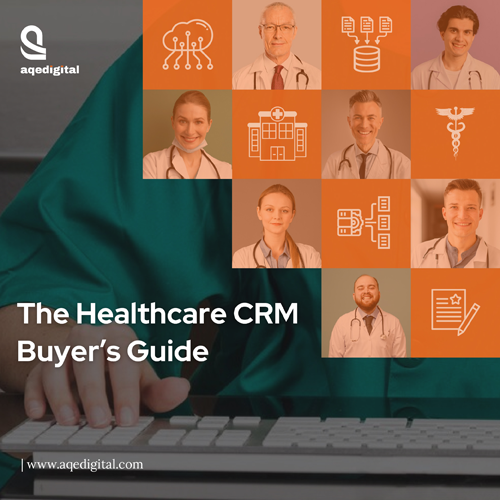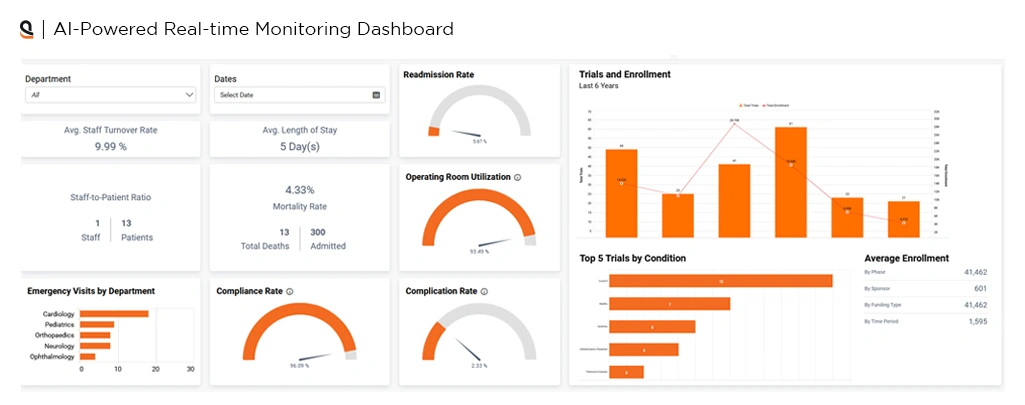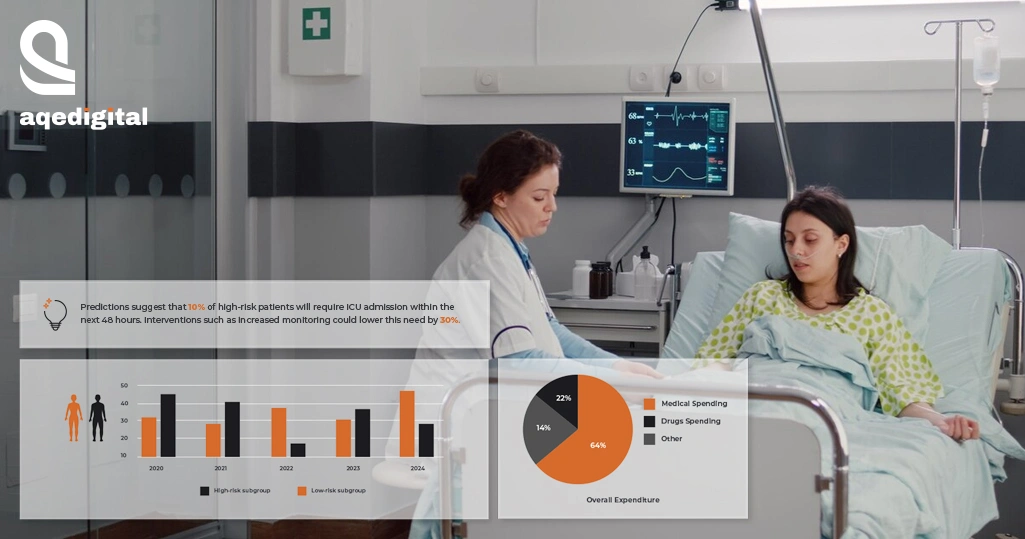About 1 in 5 patients are readmitted to the hospital within 30 days of discharge. That’s a staggering $41 billion annually in avoidable costs in the U.S. alone. These readmissions aren’t just expensive—they often mean worse outcomes for patients!
For many, being readmitted means facing new complications, higher risks, and longer recovery times. For hospitals, it means more pressure, less capacity, and a negative impact on their reputation and finances.
Reducing readmissions isn’t just about saving money—it’s about improving lives. It’s about giving patients a chance at better health, and healthcare systems a chance to function more efficiently.
The good news: AI Healthcare Solutions are making hospitals smarter—cutting readmissions by 45%. Not only does it improve patient health but it also helps hospitals operate more efficiently and reduce costs. Let’s dive into how AI makes it happen.
Why Are Hospitals Turning to AI?
Hospitals have mountains of data! From patient histories and treatment plans to lab results and real-time vitals, it can feel like trying to find a needle in a haystack. For hospital managers, it’s overwhelming, right?
AI healthcare solutions can make all that data work for you. It doesn’t just process information; it transforms it into actionable insights to help prevent unnecessary hospital readmissions and reduce hospital readmissions overall.
Instead of spending hours sifting through charts and notes, imagine having an intelligent assistant that analyzes all that data and flags high-risk patients for you. That’s exactly what AI can do.
Key AI-Powered Solutions for Hospital Readmission Reduction by 45%
1. Predictive Analytics: Spotting At-Risk Patients Early
Predictive analytics in healthcare taps into vast datasets—like medical history, lab results, and real-time vitals—using advanced machine learning. It applies algorithms like random forests and neural networks to spot trends and predict which patients are at high risk of readmission.
By creating real-time risk assessments, predictive analytics empowers healthcare teams to take proactive action. This could mean adjusting care plans or personalizing treatments based on the predicted risks, ultimately supporting hospital readmission reduction.
The result? Fewer readmissions, better patient recovery, and optimized resource use, all contributing to lower overall costs for the hospital.
Predictive analytics can help hospitals save $5.5 billion annually by preventing avoidable readmissions, according to a study by the American Hospital Association.
2. Risk Stratification: Personalized Care for Each Patient
AI’s ability to classify patients based on their likelihood of hospital readmission is a game-changer for hospitals. Using machine learning algorithms and predictive models, AI analyzes vast amounts of patient data—such as medical history, lab results, vitals, and even social determinants of health—to assess the risk each patient poses for hospital readmission and help reduce hospital readmissions effectively.
AI sorts patients into risk categories, from low to high, based on patterns it identifies in their data. For example, patients with chronic conditions, multiple comorbidities, or those who were discharged recently are flagged as high-risk. These predictions allow hospitals to focus their resources on patients most in need of extra attention.
Once high-risk patients are identified through predictive analytics in healthcare, providers can customize care plans specifically for them. This could include more frequent follow-ups, personalized discharge instructions, or connecting patients with community health services to ensure they’re supported post-discharge.
Personalized care plans not only improve patient outcomes but also make hospital care more efficient, reducing costs and improving the overall quality of care.
AI risk stratification helps hospitals predict readmissions 70% more accurately, ensuring the right care goes to the patients who need it most.
3. Early Warning Systems: Detecting Deterioration in Real-Time
Early Warning Systems (EWS) powered by AI are transforming how hospitals monitor patients. AI algorithms continuously monitor patient data, like heart rate, oxygen levels, blood pressure, and other critical metrics and medicine using Telemedicine Management. It looks for subtle changes that indicate potential complications, even before they become clinically visible.
With real-time patient monitoring, when the system detects concerning trends, it sends real-time alerts to healthcare providers. This allows them to intervene early—adjusting treatments, administering medications, or providing immediate care before issues escalate.
EWS using AI can enable healthcare teams to respond to patient deterioration 60% faster, ensuring timely interventions and supporting hospital readmission reduction by preventing avoidable readmissions.
EWS using AI can enable healthcare teams to respond to patient deterioration 60% faster, ensuring timely interventions and preventing avoidable hospital readmissions.
4. Outbreak Prediction: Preventing Healthcare Crises
AI in healthcare systems analyzes data from various sources, including local and global disease reports, patient histories, environmental data, and even social factors.
Machine learning algorithms in AI in healthcare identify early warning signs of outbreaks—whether it’s a flu season spike or a sudden rise in infections like COVID-19. The system uses these patterns to forecast potential surges in cases.
By analyzing patterns from historical data, current infection trends, and even real-time reports, AI can predict potential outbreaks, allowing hospitals to prepare and respond proactively to reduce hospital readmissions.
Predicting outbreaks using AI allows hospitals to respond 20% faster, helping to contain infections early and avoid the consequences of delayed interventions, including hospital readmissions.
Predicting outbreaks using AI allows hospitals to respond 20% faster, helping to contain infections early and avoid the consequences of delayed interventions, including hospital readmissions.
5. Enhanced Care Coordination: Improving Communication Across Teams
AI helps ensure that the right care is delivered at the right time, with all relevant parties informed and involved.
Predictive analytics in healthcare tools integrate data from multiple sources—electronic health records (EHR), lab results, real-time patient monitoring devices, and even communication platforms—into a unified system that healthcare providers can access in real-time. This centralization ensures that physicians, nurses, social workers, and other specialists are all on the same page regarding patient care.
When a patient’s condition is worsening, real-time patient monitoring enables the system to automatically notify the entire care team. It can also flag potential complications or gaps in care, prompting follow-ups and coordination to address issues before they result in readmissions.
When care teams are more aligned, 40% more patients follow through with their discharge and follow-up care plans, significantly lowering hospital readmission risks.
6. Transition Management: Ensuring Smooth Discharges
By generating personalized discharge instructions and care recommendations, such as follow-up appointments, medications, and lifestyle changes, AI can help ensure hospital readmission reduction by making monitoring easier and more effective.
AI in healthcare-ML tools also provide healthcare providers with alerts if patients miss critical follow-ups or experience early warning signs of complications. In some cases, AI-powered virtual assistants can even check in with patients directly, asking about symptoms or confirming medication adherence.
AI solutions for hospitals that monitor patient progress after discharge have been shown to reduce post-discharge complications by 50%, which plays a crucial role in preventing hospital readmissions.
7. Real-Time Monitoring: Continuous Patient Data Tracking
AI-powered monitoring systems track a patient’s vital signs—such as heart rate, oxygen levels, blood pressure, and more—24/7. These systems pull data from wearables, sensors, and hospital equipment, offering continuous feedback. The AI algorithms process this data, identifying trends or irregularities that could indicate health risks and help reduce hospital readmissions.
If the AI detects any signs of deterioration, such as a drop in oxygen levels or irregular heart patterns, it immediately alerts healthcare providers, who can intervene before the situation worsens using predictive analytics in healthcare.
For patients discharged with chronic conditions like heart disease or diabetes, real-time patient monitoring ensures that their recovery is on track and that no potential complications are missed
AI-based real-time monitoring increases the accuracy of detecting health risks by 80%, compared to traditional methods, which helps hospitals intervene faster and more effectively.
8. Remote Patient Monitoring: Care Beyond the Hospital Walls
Real-time patient monitoring (RPM) uses wearable devices and mobile health apps to track patients’ vital signs, such as heart rate, blood pressure, oxygen levels, and glucose levels, from the comfort of their homes.
The data is transmitted to healthcare providers, who can monitor patients remotely. AI systems analyze this data to detect any early warning signs of potential complications or deterioration.
When AI algorithms detect concerning trends, healthcare providers are immediately alerted. Providers can reach out to patients directly, offer guidance, adjust treatment plans, or recommend further medical attention if needed—before issues escalate and require hospital readmission, supporting hospital readmission reduction efforts.
With RPM, patients are more likely to follow their care plans, leading to 60% better adherence to post-discharge instructions and treatment regimens.
9. Clinical Decision Support Systems: Data-Driven Treatment Decisions
When a healthcare provider is treating a patient, AI in healthcare-powered CDSS suggests the most effective treatment options based on current data, the patient’s specific conditions, and best practice guidelines. These recommendations ensure that treatment plans are comprehensive, accurate, and up-to-date with the latest medical advancements.

Download Your Healthcare CRM Guide
Send download link to:
By assisting providers in making informed decisions, CDSS can help ensure that patients receive the right treatments, reducing the chances of complications and hospital readmission, ultimately helping to reduce hospital readmissions.
Furthermore, predictive analytics in healthcare-powered CDSS can flag potential drug interactions, suggest follow-up care, and even help identify patients who may benefit from additional monitoring—all of which contribute to lowering readmission rates
Hospitals that use AI-powered Clinical Decision Support Systems have seen a 25% reduction in readmission rates by providing more accurate, personalized treatment decisions.
10. Diagnostic Assistance: Enhancing Accuracy with AI Tools
AI can analyze radiology images to detect signs of pneumonia, cancer, or fractures, or it can examine lab results to spot early markers of infections or other health risks. The system provides healthcare providers with accurate, data-driven insights to support their decision-making process.
When AI detects potential health issues through real-time patient monitoring, it alerts clinicians with recommendations, often flagging conditions that require immediate attention.
AI tools also assist in tracking the progression of a disease, identifying complications, and helping doctors make more precise diagnoses for treatment.
Early detection, supported by real-time patient monitoring, ensures that conditions are treated before they worsen, minimizing the need for emergency interventions or follow-up hospital stays.
AI tools can help clinicians diagnose conditions 15% faster, allowing for quicker interventions and better patient outcomes.
11. Drug Interaction Predictions: Preventing Harmful Medication Effects
When a patient is prescribed a new medication, AI in healthcare systems cross-references the patient’s medical history, current medications, and conditions to identify any harmful interactions that could lead to complications or hospital readmission.
If a potential drug interaction is detected, AI alerts healthcare providers in real time. These alerts can help prevent prescribing conflicting medications or allow for adjustments in dosages before the patient experiences negative side effects.
AI can also provide recommendations for safer alternatives or monitor patients more closely when potential interactions are unavoidable.
Hospitals using AI-driven drug interaction prediction systems have seen up to a 20% reduction in adverse drug reactions.
12. Patient-Centered Care: Engaging Patients for Better Health Outcomes
AI tools, such as mobile health apps, virtual assistants, and self-triage platforms, provide patients with personalized health information and real-time feedback on their conditions, helping to reduce hospital readmissions.
We create such tools to guide patients through their care plans, offer educational resources, remind them of medication schedules, and help track their symptoms or progress.
Predictive analytics in healthcare-powered AI systems can offer tailored recommendations for lifestyle changes, diet, exercise, and symptom monitoring. They can also remind patients of critical follow-up appointments and provide them with real-time advice if their symptoms worsen, helping them avoid unnecessary visits to the hospital.
Additionally, these systems can empower patients to communicate directly with their healthcare providers for advice, ensuring they feel supported at all times.
Studies show that hospitals using AI-powered patient engagement tools report a 35% hospital readmission reduction rate as patients take a more active role in managing their health.
AQe Digital Role in AI-Driven Readmission Prevention
As the healthcare industry evolves, we are committed to helping hospitals use AI to not only reduce readmissions but to transform how they deliver care.

Through our customizing AI-powered solutions and real-time patient monitoring, healthcare providers can identify at-risk patients before they experience complications, engage patients in their own recovery with tailored resources, and ultimately, enhance overall patient care while cutting unnecessary costs. We can make your hospital smarter, safer, and more efficient!

